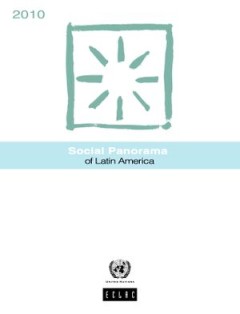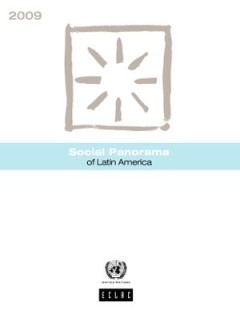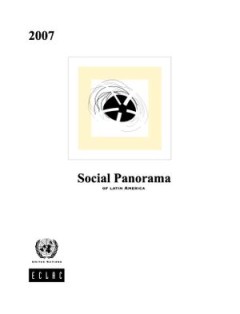Filter by

Social Panorama of Latin America 2015
The 2015 edition of Social Panorama of Latin America analyses poverty trends, as measured by ECLAC. It also examines changes in income distribution and in other aspects of inequality. With a view to contributing to the development of public policies to overcome poverty and socioeconomic inequality, this edition examines the latest trends in social spending and the challenges posed by demographi…
- Edition
- -
- ISBN/ISSN
- 9789211219258
- Collation
- -
- Series Title
- -
- Call Number
- 650

Social Panorama of Latin America 2014
The 2014 edition of Social Panorama of Latin America presents ECLAC measurements for the analysis of income poverty, taking, as well, a multidimensional approach to poverty. Applying these two approaches to data for the countries of the region provides confirmation that despite the progress made over the past decade, structural poverty is still a feature of Latin American society. In order to c…
- Edition
- -
- ISBN/ISSN
- 9789211218824
- Collation
- -
- Series Title
- -
- Call Number
- 650

Espaços Culturais; vivências, imaginações e representações
O que há de comum entre as representações dos índios Terena do Mato Grosso do Sul, o espaço sagrado no islã Shi´i, a Irmandade da Boa Morte na Bahia, as festas em louvor a São João Batista, as representações do Brasil Sertanejo, as representações e territorialidades homoeróticas e os naturistas? Responder esta pergunta não é algo simples, mas a resposta está na idéia de que as…
- Edition
- -
- ISBN/ISSN
- 9788523211899
- Collation
- -
- Series Title
- -
- Call Number
- T 153.7 SER e

Social Panorama of Latin America 2013
The 2013 edition of Social Panorama of Latin America presents ECLAC official measurements for the analysis of income poverty and seeks fresh approaches to poverty and well-being, placing special emphasis on multidimensional approaches. These approaches are exploratory and therefore not comprehensive. They have nevertheless been tackled in this year’s edition of Social Panorama because one thi…
- Edition
- -
- ISBN/ISSN
- 9789212211190
- Collation
- -
- Series Title
- -
- Call Number
- 650

Erinnerung und Identität; Literarische Konstruktionen in Doeschka Meijsings …
Erinnerung und Identität gelten als zentrale Themen der Kurzgeschichten und Romane von Doeschka Meijsing (1947-2012) - doch deren literarische Inszenierungen wurden bislang kaum untersucht.
- Edition
- -
- ISBN/ISSN
- 9780000000595, 9783839450444
- Collation
- -
- Series Title
- -
- Call Number
- T 809.3 LAM e

Social Panorama of Latin America 2012
To cast new light on social inequality, the 2012 edition of Social Panorama of Latin America is devoted mainly to aspects of caregiving on which systematized information for the region has not been available hitherto: paid employment in care-related activities, household expenditure on care, and the situation and care needs of persons with disabilities. This edition aims, in fact, to generate k…
- Edition
- -
- ISBN/ISSN
- 9789211218244
- Collation
- -
- Series Title
- -
- Call Number
- 650

Social Panorama of Latin America 2011
For Social Panorama of Latin America, the main challenge is to foster a more in-depth examination of social gaps and the mechanisms that reproduce or decrease them. The previous edition of Social Panorama homed in on inequality gaps and their intergenerational reproduction and paid particular attention to the formative years of individuals, their transition to adult life and the role of social …
- Edition
- -
- ISBN/ISSN
- 9789210210874
- Collation
- -
- Series Title
- -
- Call Number
- 650

Social Panorama of Latin America 2010
In 2010 the Economic Commission for Latin America and the Caribbean (ECLAC) proposed a comprehensive development strategy entitled Time for equality: closing gaps, opening trails (ECLAC, 2010). From a rights-based perspective, development is treated as an indivisible, rights-based process in which synergies are created between a macroeconomy that pushes back the frontiers of growth as an engine…
- Edition
- -
- ISBN/ISSN
- 9789211217544
- Collation
- -
- Series Title
- -
- Call Number
- 650

Social Panorama of Latin America 2009
The 2009 edition of Social Panorama of Latin America links trends in poverty and income distribution with social protection systems, placing special emphasis on how these systems have responded to the social impacts of the current crisis and on medium- and long-term projections. It focuses in particular on the impact of public transfers, trends in social spending, the mechanisms by which social…
- Edition
- -
- ISBN/ISSN
- 9789211217292
- Collation
- -
- Series Title
- -
- Call Number
- 650

Social Panorama of Latin America 2007
Per capita GDP has grown more in 2003-2007 than at any other time since the 1970s. ECLAC projections indicate that this trend will continue in 2008, which will thus be the fifth year in a row in which per capita GDP has risen at over 3% per annum. This increase has made further progress in poverty reduction possible, together with a decline in unemployment. Some countries have seen improvements…
- Edition
- -
- ISBN/ISSN
- 9789211216547
- Collation
- -
- Series Title
- -
- Call Number
- 650
 Computer Science, Information & General Works
Computer Science, Information & General Works  Philosophy & Psychology
Philosophy & Psychology  Religion
Religion  Social Sciences
Social Sciences  Language
Language  Pure Science
Pure Science  Applied Sciences
Applied Sciences  Art & Recreation
Art & Recreation  Literature
Literature  History & Geography
History & Geography